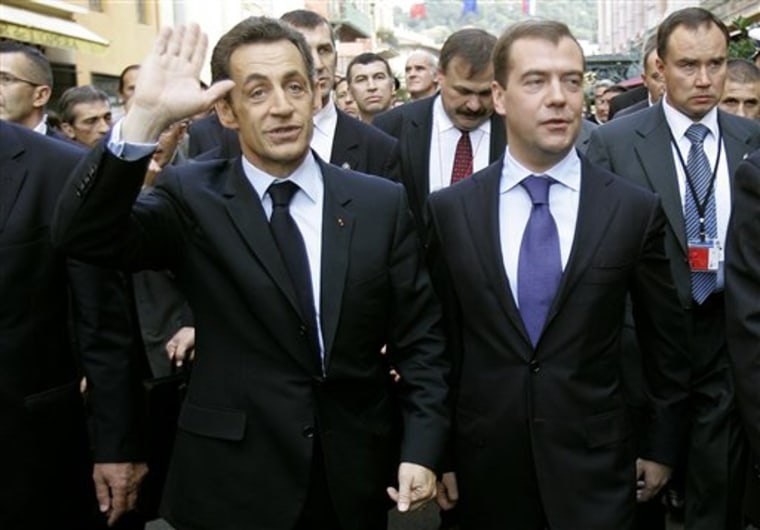French President Nicolas Sarkozy undercut the American rationale for a U.S. missile shield in Eastern Europe on Friday by saying that the system would do nothing to improve European security.
Sarkozy's comments were the strongest to date by an American ally against the missile-defense plans, which have infuriated Russia despite the Bush administration's insistence that they're aimed at protecting Europe from Iran.
"Deployment of a missile defense system would bring nothing to security in Europe ... it would complicate things, and would make them move backward," Sarkozy said after a summit with Russian President Dmitry Medvedev. Medvedev smiled and pointed his finger at Sarkozy in approval after the comments from the French president.
The remarks came at the end of a week in which the U.S. and Russia rejected each other's proposed solutions to the standoff over the missile plans, making it increasingly likely that it will not be resolved before President-elect Barack Obama takes office.
Obama has not been explicit about his intentions on European missile defense, saying it would be prudent to "explore the possibility" but expressing some skepticism about the technical capability of U.S. missile defenses.
Moscow sees the defense plans as a Cold War-style project that could eliminate Russia's nuclear deterrent or spy on its military installations. Russia recently threatened to install short-range missiles close to EU borders in response to the U.S. plans for a missile defense system in Poland and the Czech Republic. Much of Western Europe is nervous about the idea of such major defensive weaponry stationed around the continent.
Sarkozy has generally been hawkish on Iran and allied himself more closely with Bush than his predecessor Jacques Chirac. But Sarkozy is also clearly looking ahead to his relations with Bush's successor.
'We all live in one house'
The governments of Poland and the Czech Republic said Friday they hope the new president will go ahead with the missile defense plans.
Medvedev argued against any such "unilateral" moves.
He suggested that the Russian threat to install Iskander missiles in the Baltic Sea region of Kaliningrad — announced just hours after Obama's election — was "a response to the behavior of certain European states that agreed to deploy new (missile defenses) on their own territories without consulting anyone."
"We all live in one house, let's all get together and find a way to reach an agreement," he said.
Meanwhile, Friday's summit made a key step toward rapprochement between Russia and the European Union: The EU announced the resumption of partnership talks with Russia that had been put on hold because of the war in Georgia.
Critics, including the United States and Georgian governments and human rights groups, say it is too soon to forgive Russia, in effect, when Russian troops remain implanted and unchecked in the two breakaway Georgian provinces at the core of the war.
Seeking 'cooperation'
Sarkozy, temporarily in charge of the 27-nation EU, insisted that the resumption wasn't "a sign of weakness."
He and Medvedev remained divided, though, over the continuing presence of Russian troops.
Medvedev insisted that a cease-fire deal brokered by Sarkozy has been "fully fulfilled," while Sarkozy insisted that work remains to be done.
The European Union is Russia's No. 1 customer and No. 1 investor. With the world financial crisis shaking markets in Europe and beyond, officials of the 27-nation EU say reaching out to Moscow is crucial to ensuring stability and to keeping Russia from shutting off its economy to outsiders.
Medvedev pointed on Friday to the lucrative trade between the EU and Russia, worth hundreds of billions of euros annually.
"We should think of this when we make decisions on all cooperation," he said.
The EU-Russia talks, launched in 2007, aim for an agreement that would increase economic integration, tighten relations on justice and security and boost cooperation in education and science. U.S. diplomats warned European officials that the resumed talks could undermine Western attempts to rein in the Kremlin's aggressive foreign policy.
